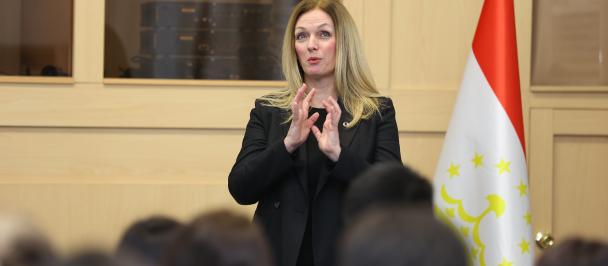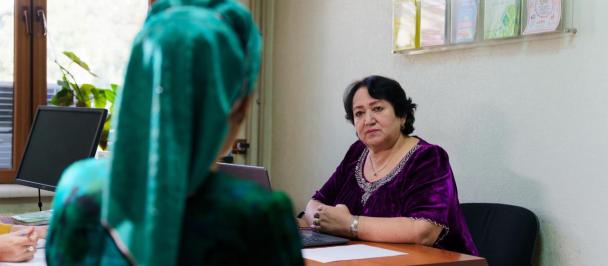Overcoming TB and stigma: The inspiring journey of Gulnora
October 26, 2023

Gulnora Azimova, a Tajik woman from the village of Sarakishti, Tajikistan
Mother of four Gulnora Azimova, 34, from the small village Sarakishti in Tajikistan, dreamed of one day becoming a doctor.
In her late teens, she was at school in Dushanbe, hoping to go to university and study medicine. But at the age of 17, before she graduated from school, her parents arranged a marriage for her. She moved to a kishlak, or small village, with her new husband, where she soon found herself as a housewife, raising four children.
A few years later, in 2017, she would become acquainted with the healthcare system – though not as a doctor but as the parent of patients. Tuberculosis struck her family, with her two sons, Abdurakhmon, 8, and Azamjon, 6, contracting the potentially deadly disease.
"It was a challenging time, and it hardened me as a person, and it's difficult to reflect on all the challenges I had to face,” she says. “It took two years to go through the treatment therapy.”
Her youngest son Azamjon required hospitalization, and the hospital was a gruelling six-hour journey from their home.
"My husband was working outside Tajikistan to support the family, so I had to rely on my mother and relatives to care for my other children. I also had to carry my baby daughter with me to the hospital, as I was breastfeeding her."
Eight months later, she was able to take Azamjon home and continue his treatment there.
The government provided medication free of charge, and with unwavering determination and the support of healthcare professionals and NGOs, Gulnora's sons successfully recovered from the disease.
“My sons are now both healthy, attending school, and actively participating in sports,” she says proudly.
“Azamjon does sumo and recently won a local competition.”
But the period of their recovery wasn’t easy, she admits, "The most challenging thing was overcoming the stigma about the disease. My children were denied an education, faced discrimination, and even our own relatives wouldn't invite us to family events. We felt like outcasts, despite doctors assuring us that the disease wasn't contagious anymore.”
She vividly remembers her sons suffering from stigma in their community, making them reluctant to attend school due to bullying.
But Gulnora insisted that her children be allowed to continue their education, and convened a local meeting with parents and teachers, where MSF volunteers persuaded the community that the boys had recovered from the disease, and were no longer contagious.
Gulnora now sees her mission to be to share her story and help women like her find the strength and bravery to speak up, encouraging them to access the healthcare system instead of hiding the disease. Her advice for people affected by tuberculosis is not to be afraid, and to fight for your rights and your children.
“Tuberculosis is treatable, but it's crucial to seek treatment promptly. Never give up,” she says at the regional conference on integrated tuberculosis control in Central Asia, which was held in Dushanbe on 25-26 October 2023.
Gulnora's story is an inspiring example of the importance of accessible healthcare and support in the fight against tuberculosis, discrimination, and other barriers in Tajikistan.
Since January 2003, the UN Development Programme, with funding from the Global Fund, has worked closely with the Ministry of Health and Social Protection of the Population of Tajikistan on disease prevention, treatment, and social support for the people of Tajikistan. This long-term partnership is committed to removing discriminatory, gender, and legal barriers, thus improving access to HIV and TB-related services for affected populations, as well as better integrating TB and HIV services in Tajikistan.
Story by Yuliia Samus / UNDP

 Locations
Locations



